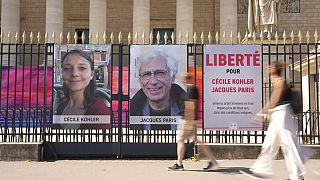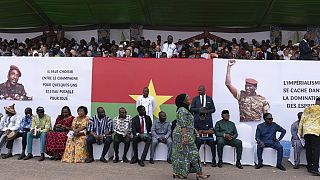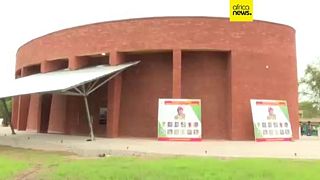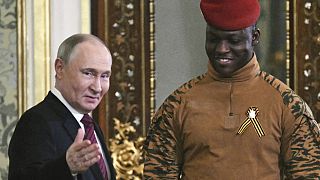Burkina Faso
Burkina Faso strongman Lieutenant-Colonel Paul-Henri Sandaogo Damiba was inaugurated as president on Wednesday, just over three weeks after he led a coup to topple elected head of state Roch Marc Christian Kabore.
In a televised ceremony, Damiba swore an oath before the country's top constitutional body to "preserve, respect, uphold and defend the Constitution", the nation's laws and a "fundamental act" of key decisions approved by the junta.
Damiba was dressed in camouflage uniform and a red beret, and wore a sash in the colours of Burkina's national flag.
The press, but no foreign representatives, attended the ceremony in a small room at the offices of the Constitutional Council.
Expectations and reactions soon followed the swearing in ceremony amongst residents of the capital Ouagadougou.
Séverin Sawadogo, a young artist is optimistic ‘’We trust the military, because we say to ourselves "the army is not the cupboard", what it says it does. Even if it does it late or afterwards we'll see the concrete action and I think they'll keep their word."
On January 24, Damiba, 41, led disgruntled officers to force out Kabore following public anger over his handling of a bloody jihadist insurgency.
Last week, the Constitutional Council formally determined that Damiba was president, head of state and supreme commander of the armed forces.
The move confirmed an announcement by the junta on January 31 that Damiba would be appointed to those roles for a transitional period, and be assisted by two vice presidents.
Burkina Faso has experienced repeated coups since gaining independence from France in 1960.
Since the first jihadist attacks in 2015, more than 2,000 people have died, according to an AFP tally, while the country's emergencies agency says more than 1.5 million people have fled their homes.
Emmanuel Koudougou, an executive at La Poste thinks corruption is the main problem bedevilling the nation. Koudougou wants Damiba the new head to tackle corruption.
**"He is committed to fighting against the scourges of our country, notably the politicisation of the administration, injustice, mismanagement, corruption and I think that these are scourges that have long undermined the administration and the whole of Burkina Faso and we can only wish him good luck and I have faith that he will succeed."
**
- Election issue -
The ceremony observed a minute's silence for the victims.
Damiba paid tribute to "the Burkinabe people, who have been enduring the scars of terrorism for more than six years" and called for "collective awareness about the effort and sacrifice" that were needed for the fight.
The junta suspended the constitution immediately on taking power on January 24, but later reversed this in the face of pressure from neighbours in West Africa demanding a return to civilian rule.
The military authorities have promised to re-establish "constitutional order" within a "reasonable time" but the issue of a date for elections remains unsettled.
On February 5, the junta announced that a 15-member commission would be tasked with "drawing up a draft charter and agenda, together with a proposal for the duration of the transition period."
Burkina was suspended on February 3 from the West African bloc ECOWAS, the 15-nation Economic Community of West African States.
But ECOWAS envoys came back with positive news from talks with the junta.
The bloc decided against punishing Burkina with further sanctions -- unlike coup-hit Guinea and Mali, which have been hit with border closures, an embargo on trade and financial transactions and sanctions against individuals for perceived foot-dragging over holding elections.
Instead, ECOWAS called for "the speedy creation of a reasonable timetable" for the return to civilian rule.
- Jihadist fighter -
"At these difficult moments, our country has not been abandoned by its partners," Damiba said on Wednesday.
"Burkina Faso reiterates its readiness to work in full sovereignty with all partners in mutual respect."
On January 31, Burkina was also suspended by the African Union "until the effective restoration of constitutional order."
The UN Security Council on February 9 expressed "serious concern" over the country's "unconstitutional change of government," but chose not to describe it as a military coup or even condemn it outright.
Damiba has had first-hand experience of the jihadist insurgency.
Before seizing power, he was commander of the 3rd Military Region, which covers eastern Burkina Faso -- one of the worst-hit areas.
A military source, speaking after the coup, described Damiba as "a tough commander who has been on the front line with his men".
Before the coup, Damiba criticised prevailing strategies to fight the jihadists, publishing a book last June called "West African Armies and Terrorism: Uncertain Answers?"













01:12
ECOWAS calls for restraint in violent protests in Togo
Go to video
Alliance of Sahel States puts on show of unity through inaugural games
01:13
17 soldiers killed as gunmen raid army bases in northern Nigeria
01:47
Sierra Leone’s Bio takes over as ECOWAS chair
01:31
Sahel region hardest-hit by terrorism worldwide, says Global Terrorism Index 2025
Go to video
ECOWAS leaders meet in Abuja amid regional tensions and leadership transition